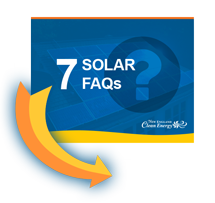IMPORTANT NOTE: If you are already in the SREC I or SREC II program, nothing changes. You will continue to earn SRECs for the remainder of your 10-year period. People signing up for SRECs and going solar in the next few months also get 10 years of SRECs. People signing up for solar in 2018 will not get SRECs; they will be eligible for the SMART program instead.*
For the past seven years, Massachusetts solar owners have been able to earn Solar Renewable Energy Certificates (SRECs) for the energy produced by their solar energy systems. Sadly, this program is coming to an end. The replacement program will provide much lower “green income” to those going solar.
This article doesn’t discuss why the SREC program is ending. (OK, just a smidge on that: The positive take is that solar incentives were always designed to decline over time. The cynic in me thinks state leadership bought the utilities’ “cost” arguments hook, line, and sinker. Since solar has cut into the monopoly utility business by a whole 4%, it must be slowed down…)
 What’s replacing SRECs? The Solar Massachusetts Renewable Target program. Yes, that’s SMART, subject to individual interpretation. I’ll explain how SMART works in a minute.
What’s replacing SRECs? The Solar Massachusetts Renewable Target program. Yes, that’s SMART, subject to individual interpretation. I’ll explain how SMART works in a minute.
First, let me save you the agony of waiting and put the big reveal upfront: A typical homeowner going solar in 2018 with the SMART program will get $8,000 less from the state than if he or she goes solar in 2017 in time to get SRECs.*
My Analysis
Here’s how I reached that figure. I calculated the SREC payments for a typical system:
- Average system size – 8,000 watts (about 24 SunPower panels or 29 conventional panels)
- Roof quality 80% of ideal
- 9,300 kWh of production in the first year
- About 91,000 kWh over the 10-year term of the SRECs
- SRECs start out at the 2017 floor price of $0.27 per kWh and drop about 6% to a new floor price each year. In the tenth year, SRECs are worth about $0.17 per kWh.
SREC income for this system is about $19,000, or about $1,900 per year. That’s above and beyond the electricity savings you see from net metering, if you’re a customer of the big utilities. (Net metering values vary by municipal utility.)
If this same system is installed in 2018, the SMART benefit is about $10,400 over 10 years – or about $1,000 per year. That’s a 45% decrease from SREC prices. Therefore, if you wait for the SMART program, you give up more than $8,000.
Bottom line: If you are thinking about going solar and $8,000 is important to you, now is the time.
It’s even worse for homeowners in towns served by municipal light departments, who are eligible for SRECs but aren’t eligible for SMART. So going solar in 2018 means $19,000 less benefit than going solar in 2017. Read more about the muni situation here.
How SMART Works
This is based on my interpretation of the program as described by the Massachusetts Department of Energy Resources (DOER) in this presentation on SMART. Program details are not final, but my understanding is that the numbers are unlikely to change.
Step 1. The SMART incentive will be set through an auction. Large solar installers will bid to do solar farm projects in the Commonwealth. However, they won’t bid on the project cost, they will bid for the incentive. The lowest bid wins. The incentive starts at $0.15 per kWh. But say an installer of large commercial arrays thinks they can be successful getting paid at $0.13 per kWh. Then that’s what they bid. Another installer thinks they can be successful at $0.11 per kWh so they bid that. All the bids are collected and the winner is the installer with the lowest bid.
Step 2. The DOER program dictates that residential programs will receive 2 times (or 2.3 times, for low-income households) the incentive that the large commercial projects settled at, in the process described in Step 1.
Thus, if commercial projects settle at $0.15 per kWh, the residential incentive is $0.30 (or $0.35 for a low-income household). This does not mean you get $0.30 above and beyond your net metering (as the SREC does now). Instead, you receive $0.30 for every kWh you produce minus the volumetric distribution + transmission + transition charges and the 3-year average basic service rate. Simple, right? For a typical National Grid customer, that number is about $0.18 per kWh. Therefore, every kWh your solar system produces is worth $0.30 minus $0.18, or about $0.12 per kWh.
As I stated upfront, this incentive is low compared to the SREC program. Under the current SREC-II program, the average customer received $0.25 per kWh above the net metering benefit in each of the last four quarters. (See recent SREC prices here.) So the SMART solar incentive is worth less than half what the current SREC incentive is worth.
Oh, and by the way, once we reach 200 megawatts of solar in the first SMART block, the process starts over but 4% lower.
Again I say: If you are a National Grid, Eversource or Unitil customer thinking about going solar and $8,000 is important to you, now is the time. If you are a municipal light department customer and $19,000 is important to you, now is really the time.
Sign up soon to get into the SREC program before it goes away. As long as you sign up in time, you will get 10 full years of SREC green income, worth on average $19,000. Contact us today to learn more.
* Since this post was written, the Massachusetts Department of Energy Resources extended the SREC deadline to March 31, 2018. This provides a little more breathing room but we still recommend moving soon on solar if you’re interested. It takes about three months to get your solar approved and installed, a few months longer for ground-mounted systems, and more than six months for very large residential systems. Then there is winter weather, which can delay installations. Play it safe and get started today so you don’t miss out.
If you liked this article, you might also enjoy:


 Download our 7 FAQs
Download our 7 FAQs


26 Responses to “From SREC to SMART: How Massachusetts Solar Incentives are Changing”
It is a bit confusing, Now my electric bill is totally separate from my SREC(2) rebates. I produce about 4 SRECS/year I get a check about every 3 months for about $250 to $400 from srec trade. This is from my meter reading on the solar array. My electric bill says “no payment needed” year round. For 9 months a year, I produce more electricity than I use. The overage Neversource buys at about $0.16/kwh and is credited as $ for future purchases of electricity. Overall I am about even because I produce slightly more and that covers the “customer charge”.
With “smart” what will be different? Will I still get that check in the mail? Will eversource credit me for excess power? Or will this be combined so my outgoing meter be irrelevant since the NET meter captures everything and SREC checks disappear? Instead will eversource be sending me a check?
Hi Ed – NOTHING changes if you are already in the SREC I or SREC II program. You will continue to earn SRECs for the entire 10-year period.
If my solar system was commissioned today in Massachusetts. (I am not in one of those areas where you have solar light compact etc.). What would a single SREC-2 net me? It has been my understanding that they are now only paying out at .8 value. What is the projected dollar value for this quarter?
Thank you
Hi Sean – Because SRECs are traded in a market, it’s impossible to predict pricing. However, aggregator websites like Knollwood Energy and SREC Trade publish actual SREC prices after the fact. Here are the most recent prices according to Knollwood: https://www.knollwoodenergy.com/srec-markets/ma-srec-program/ Also, SREC 2 DOES pay at 80% of SREC 1, so that’s probably what you heard.
I am currently earning SRECs. If I sell my house after 2017 does the new owner continue to get SRECs for what’s left of my ten years?
Once you’re in the SREC program (I or II), you are guaranteed to get 10 years of SRECs. And if someone buys your home, they become the owner of the solar and can get the remainder of the SRECs. You both just need to contact your SREC aggregator who will handle the necessary paperwork. (We’ve heard nothing to suggest this policy will change.)
does the program have to come with the property or can the seller continue to receive the SRECs
Thank You
Ed
Technically, you can keep the SRECs if you move, but it would mean setting up automated reporting of your production or asking the new owner to read you the production number every month. 🙂
I had Solar City install my Solar Panels about 10 months ago. I was never notified about the SREC. I called Eversource and they told me that SRECs are not allowed/recognized in Massachusetts. Please call me back so I can better understand the availability and benefits of SREC.
Thank you
Chuck Creighton
617-359-5000
Hi Chuck – SolarCity generally installs LEASED solar energy systems, so they own your solar and they get the benefits like SRECs. That’s why they didn’t bother telling you about SRECs. I can’t explain why Eversource said what they said; maybe they were referring to leased systems. Our customers generally OWN their systems, which is why they can earn SREC income. Hope that helps. If you have more questions, send another message or call us at 978-567-6527.
How will this affect businesses looking to use srecs for income in the futures that do not currently have solar installed
Hi Jerald – Businesses will no longer get SRECs. Like homeowners, they will be in the SMART program, which provides some incentive but not as generous as SRECs. The link in the article to the SMART presentation has some information on how SMART works for businesses. You could also contact DOER directly.
Little late, but in response to Sean Buckley’s comment from May, small systems that go on line after January 8, 2017 and before SMART goes into effect March 31, 2018 only get 80% of the SREC II that they would have otherwise. Even at a 20% discount, SREC II is still likely to be worth more than SMART, though. (The transition discount is bigger for large systems.)
In your example, you would only get about $15,000 in SREC income now, as opposed to $19,000 for the same system last year.
Hi Sam – Thanks for the comment. I figured the 20% “haircut” into my calculations, so the $19,000 should stand. Either way, it’s a big change, that’s for sure. — Mark
Can you tell me what qualifies for SREC II as the deadline approaches, installed system or operating and solarized?
Thanks,
Lev
Lev – It’s actually “permission to operate” which falls in between installation and being turned on and operational. However, most people turn their systems on within hours of getting permission to operate so for all practical purposes, assume the system has to be operating.
How many years does the Smart Progam pay the residential or commercial customer for(the $0.15 to $0.35 per kwh)? I had heard it was for 20 years but what happens after 20 years? Does the owner of the system just have the benefit of making the power and using it instantly and anything over produced goes to waste?
Hi Naib – As currently described, SMART incentives will pay out for 10 years for small systems (25 kW AC or less), which is the same as SRECs, and for 20 years for systems over 25 kW AC. After that, the solar owner will still have Net Metering which allows for sending excess solar energy into the grid and getting credit for that. So you don’t lose all the value of that energy. The amount of the credit varies by utility.
I’m confused about the new SMART program, today with an SREC II system I would get an SREC payment in addition to net metering credits but under the SMART program I would only get an incentive payment? How do the energy credits work?
Net metering continues so people in the SMART program will also get net metering.
Given the RFP that went out recently for solar projects which will set the SMART rate. I’m probably out of luck for the SREC program with a May 2018 install?
Source for RFP: https://pv-magazine-usa.com/2017/11/15/thats-smart-massachusetts-solicits-100-mw-of-solar-under-new-program/
Under the current proposed timing, yes, May would be too late. SRECs are scheduled to close to new sign-ups at the end of March. However…never say never. It’s a state-run program and the state has postponed start dates before.
I’m looking at building a solar system on our church in 2018-19. We are a non-profit. Is it safe to assume the residential incentive for SMART applies? I don’t have the system design yet, but is there a different incentive based on the system size?
Yes, the SMART incentive varies based on system size. If your system is 10 kW or smaller, the incentive for typical residential solar would apply. Call Mark or Amy at 978-567-6527 if you’d like a proposal.
Planning an install within the next two weeks. Any news on srecs extension? Will I make the march 31st deadline? How long before its tied to utility company and operational?
Hi there. I don’t see you on our customer list so you really should ask your own installer about its timing for utility approvals and SRECs. I can tell you, though, that the SREC program is still open for new applicants and likely will be for some time.
The comments are closed.